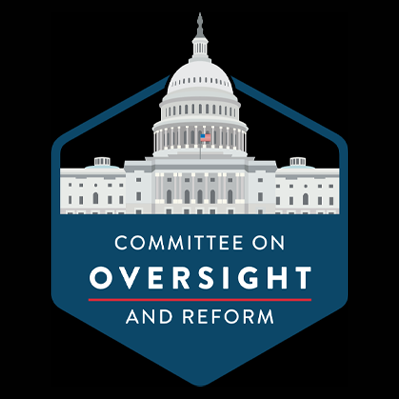Description
The Committee on Oversight and Reform is the main investigative committee of the United States House of Representatives.
The committee's broad jurisdiction and legislative authority make it one of the most influential and powerful panels in the House. Its chairman is one of only three in the House with the authority to issue subpoenas without a committee vote or consultation with the ranking member. However, in recent history, it has become practice to refrain from unilateral subpoenas.
Carolyn Maloney (D-New York) served as acting chair of the committee following the death of Elijah Cummings (D-Maryland) on October 17, 2019; she was elected chair a month later. Representative Jim Jordan served as ranking member from January 3, 2019, until March 12, 2020. On March 31, 2020, Jordan started his second stint as ranking member. Representative Mark Meadows served as ranking member from March 13, 2020, until March 30, 2020, when he resigned his congressional seat to become White House Chief of Staff.[6epresentative James Comer (R-Kentucky) was selected to succeed Meadows on June 29, 2020.
History
The panel now known as the Committee on Oversight and Reform was originally the Committee on Expenditures in the Executive Departments, created in 1927 to consolidate 11 separate Committees on Expenditures that had previously overseen the spending of various departments of the federal government.
The modern-day committee's immediate predecessor, the Committee on Government Operations, was established in 1952. The new name was intended to reflect the committee's broad mission: to oversee "the operations of Government activities at all levels with a view to determining their economy and efficiency".
After Republicans gained control of the House in the 1994 elections, the committee was reorganized to include seven subcommittees instead of 14. This reorganization consolidated the jurisdiction previously covered by three full committees and resulted in a 50 percent cut in staff. In 2007, a reorganization under a new Democratic majority combined the duties of the seven subcommittees into five.
In the 106th Congress, the panel was renamed the Committee on Government Reform. While retaining the agenda of the former Committee on Government Operations, the new committee also took on the responsibilities of the former House Committee on the Post Office and Civil Service and the Committee on the District of Columbia. On January 4, 2007, the 110th Congress renamed it the Committee on Oversight and Government Reform. The name was changed again by the 116th Congress to its current iteration: the Committee on Oversight and Reform. Since 2007, it has been called the "Oversight Committee" for short.
Subpoena usage
In 1997, the Republican majority on the committee changed its rules to allow the chairman, Dan Burton (R-Indiana), to issue subpoenas without the consent of the committee's ranking Democrat. From 1997 to 2002, Burton used this authority to issue 1,052 unilateral subpoenas, many of them related to alleged misconduct by President Bill Clinton, at a cost of more than $35 million.
By contrast, from 2003 to 2005, under the chairmanship of Tom Davis (R-Virginia), the committee issued only three subpoenas to the Bush administration.
After Republicans retook the House in the 2010 elections, the new chairman, Darrell Issa (R-California), escalated the use of subpoenas again, issuing more than 100 in four years during the Obama administration. That was more than the combined total issued by the previous three chairmen—Davis, Henry Waxman (D-California), and Edolphus Towns (D-New York)—from 2003 to 2010.
























